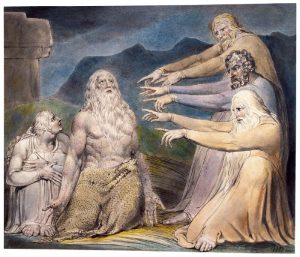WHAT HAPPENS WHEN a friend’s advice is actually the devil talking? Maybe what a friend says sounds right, but (1) it either doesn’t fit you, (2) it doesn’t fit the circumstances, (3) it comes from bad theology, and/or (4) it comes from bad motives.
 After Job loses everything, his friend Eliphaz leads off the barrage of advice from his three friends by first proclaiming that he just can’t keep himself from talking. First Warning: If a friend starts off an uncomfortable conversation that way, watch out! Instantly he shows that, even though he looks like he’s there to help Job, he is really thinking of himself. He doesn’t want to listen first, he must speak.
After Job loses everything, his friend Eliphaz leads off the barrage of advice from his three friends by first proclaiming that he just can’t keep himself from talking. First Warning: If a friend starts off an uncomfortable conversation that way, watch out! Instantly he shows that, even though he looks like he’s there to help Job, he is really thinking of himself. He doesn’t want to listen first, he must speak.
Next, he accuses Job of not practicing what he preaches. Also, an excellent way to build a friendship, right?
Then, the mixed-up theology begins to flow. Looking down—presumably—at Job sitting in the dust heap, first he insinuates that the innocent never suffer. That has simply never been true in the past, present, or future. Then he claims that the guilty always get punished. Again, that is rarely true this side of judgment day.
Then, the conversation gets interesting … and scary.
Wolves in sheep’s clothing
Job’s friend now claims to have received a special revelation from God. Second Warning: If a friend (or a book author) ever says something like that to you, run the other way. And fast! But here Eliphaz claims he had a secret encounter with a spirit in the night. More red flags. Secret? At night? Only to him?
A spooky form that made his hair stand on end spouted another mix of good and bad theology:
- “Shall mortal man be more just than God? Shall a man be more pure than his maker? (Job 4:17)” — Okay, pretty good so far … but then he continues …
- “Behold, he puts no trust in his servants; and his angels he charges with error (Job 4:18)” — Okay, where did that come from? The only angel he ever charged with error was … ah, now we get the picture! Maybe it’s Satan himself, the “angel of light” who’s talking here.
- “How much less in them that dwell in houses of clay, whose foundation is in the dust (Job 4:19)” — Okay, that’s an accurate description of us.
So, verse number 2 (4:18) is why the apostle John has to say in 1 John 4:1, “friends, do not believe every spirit, but test the spirits to see whether they are from God.”
Tell it to the Judge
Job’s friend continues into the next chapter spouting axioms about how man is born for trouble, etc. and finally declares: “But if I were you, I would appeal to God; I would lay my cause before him.” It appears that Eliphaz must have special standing before God. He certainly has a special ignorance before Job. That is, was he not aware that Job has already been appealing to God in some of the most painful prayers recorded in Scripture?
So, Eliphaz has ceased being a friend to Job and is now taking the place of a teacher or worse, a judge, in this relationship. But we know, as James says, those “who teach will be judged more strictly”. (James 3:1)
This superior posture becomes a repeated theme for Job’s friends — pretending to give good advice at the wrong time — but this instance has the dangerous tone of “new revelation” about it. A lesson we can learn is that we may sometimes be helpful in applying already received revelation to someone who has never heard it or has forgotten it. But to propose a “new” revelation from God is a very risky business indeed.